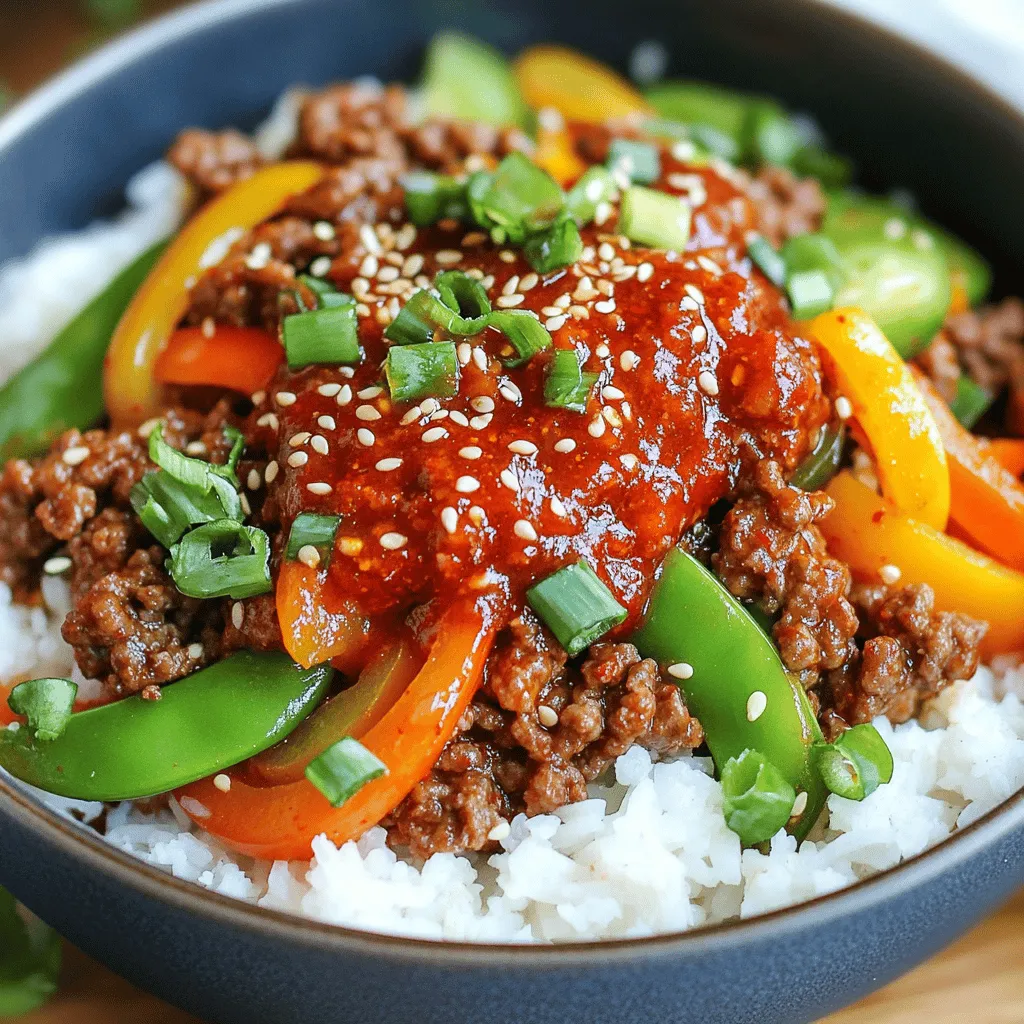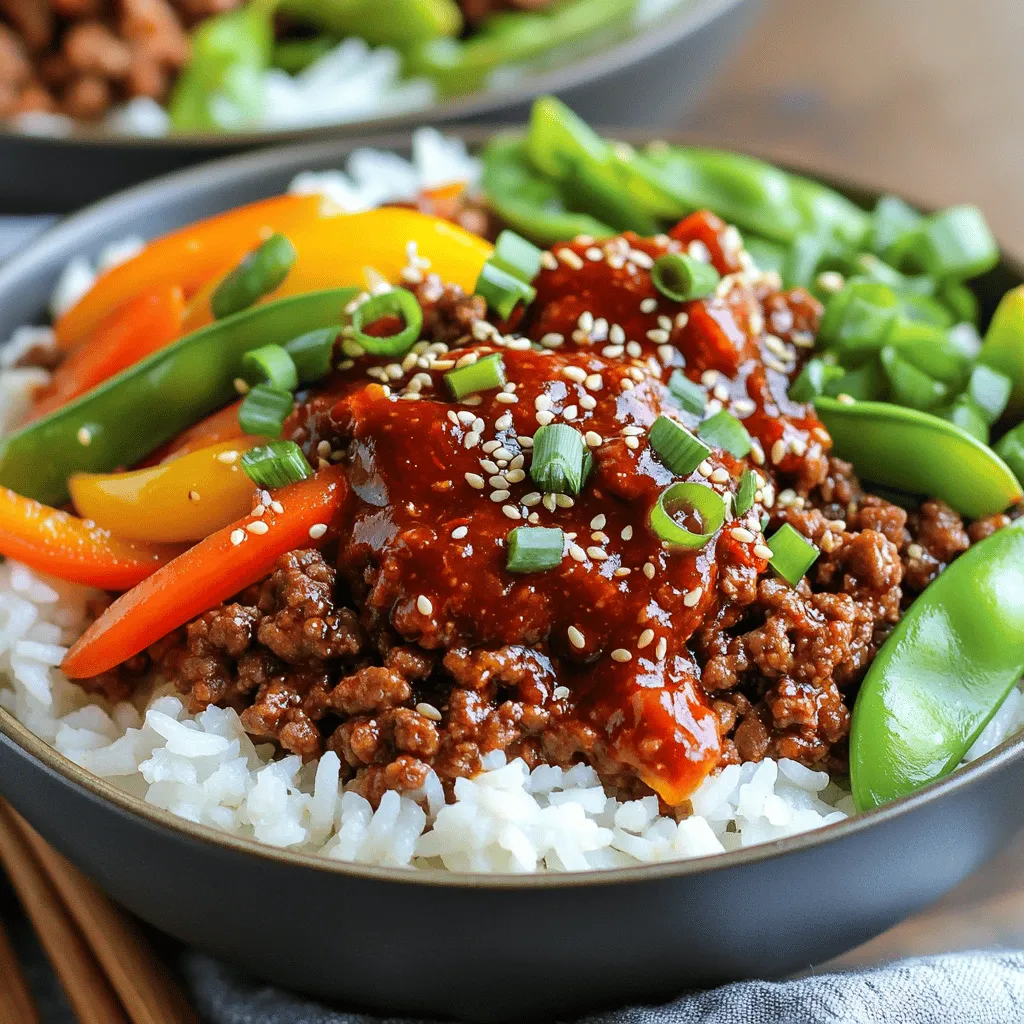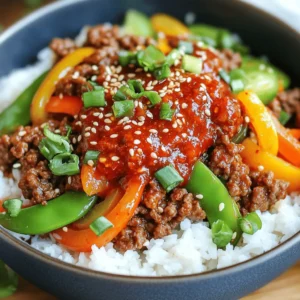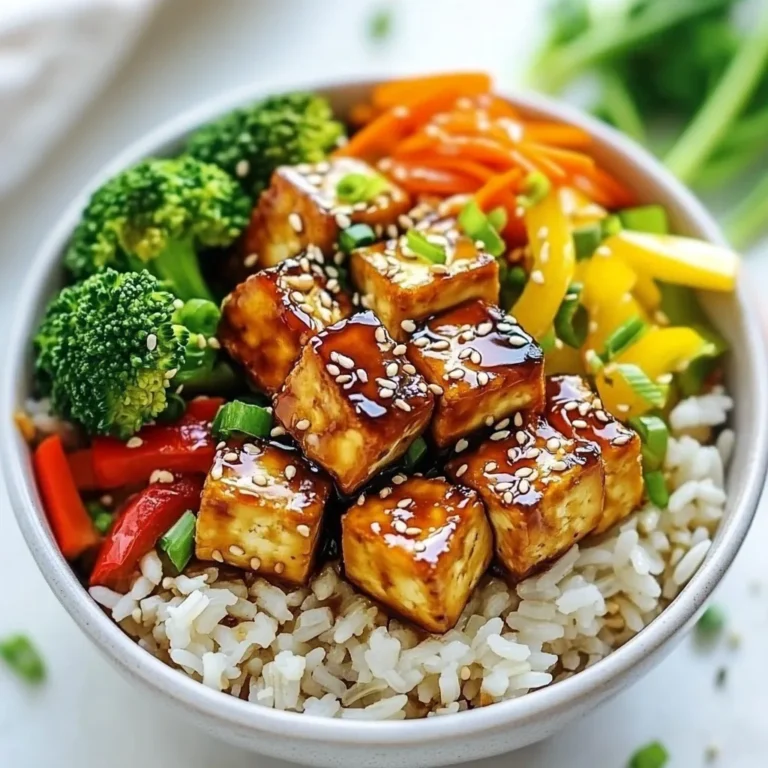Spicy Korean Beef Bowls Flavorful and Easy Recipe

Craving a tasty meal that’s quick and easy? You’re in the right spot! Spicy Korean Beef Bowls blend rich flavors and simple steps. This dish features ground beef, fresh veggies, and the star ingredient—gochujang. With just a few key items, you can whip up a delightful dinner. Get ready to fill your kitchen with amazing aromas and enjoy a dish that everyone will love! Let’s dive into this flavorful recipe!
Ingredients
Key Ingredients Overview
The Spicy Korean Beef Bowls use simple yet bold ingredients. Each one adds layers of flavor. You will need ground beef, gochujang, and fresh vegetables. These items work together to create a tasty meal.
Ground Beef and Alternatives
Ground beef is the star of this dish. It cooks quickly and absorbs flavors well. You can also use ground turkey or chicken if you prefer. For a meatless option, try crumbled tofu or tempeh. Both options work well with the sauce.
Importance of Gochujang
Gochujang is a key ingredient in this recipe. It is a Korean red chili paste that brings heat and depth. The paste is made from red chili powder, glutinous rice, fermented soybeans, and salt. This blend adds umami and sweetness to the dish. Adjust the amount of gochujang to fit your spice preference. A little goes a long way!
Step-by-Step Instructions
Preparing the Aromatics
Start with the aromatics to build a great base. In a large skillet, warm 1 tablespoon of sesame oil over medium heat. Once it’s hot, add 3 cloves of minced garlic and 1-inch grated ginger. Sauté them for about 1 minute. You want to smell that delicious aroma fill your kitchen.
Cooking the Ground Beef
Next, raise the heat to medium-high. Add 1 pound of ground beef to the skillet. Use a spatula to break apart the meat as it cooks. You want it browned and fully cooked, which takes about 5 to 7 minutes. After cooking, drain any extra grease from the skillet. This keeps your dish from being too oily.
Combining the Sauce Ingredients
Now, it’s time to add some flavor. Add 1 tablespoon of gochujang, 2 tablespoons of soy sauce, 1 tablespoon of brown sugar, and 1 tablespoon of rice vinegar to the beef. Stir well so every piece of beef gets coated in the sauce. Let it simmer for about 2 to 3 minutes. This helps the flavors mix together nicely.
Stir-Frying the Vegetables
While the beef simmers, grab another pan. Stir-fry 1 cup of mixed vegetables over medium heat. Use bell peppers, carrots, and snap peas for a colorful mix. Cook them for about 4 to 5 minutes. You want them tender but still crisp and bright.
Assembling the Bowls
Now, let’s put it all together. In each bowl, add a big scoop of cooked jasmine rice. Top it with the spicy ground beef mixture. Then, add a portion of the sautéed vegetables on top. To finish, sprinkle chopped green onions and sesame seeds over everything. Serve these bowls right away. Enjoy the warmth and flavor!
Tips & Tricks
Achieving Authentic Flavors
To bring out the best flavors in your Spicy Korean Beef Bowls, use fresh ingredients. Fresh garlic and ginger make a huge difference. They add a bright taste that dried versions just can’t match. Gochujang is key here. It gives the dish its signature heat and depth. If you want to elevate the flavor even more, add a splash of sesame oil at the end. This gives a nutty finish that enhances the whole dish.
Cooking Tips for Perfectly Cooked Beef
When cooking ground beef, keep the heat at medium-high. This helps the beef brown well. Use a spatula to break it apart as it cooks. This way, it cooks evenly without clumping. Make sure to drain any excess grease. Leaving too much fat can make the dish greasy. Lastly, let the beef simmer with the sauce for a few minutes. This allows the flavors to blend perfectly.
Storage Tips for Leftovers
If you have leftovers, store them in an airtight container. They can last in the fridge for about three days. To reheat, warm them gently in a pan over low heat. This keeps the beef tender and avoids drying it out. You can also freeze the beef mixture for up to three months. Just make sure to label it with the date. When you’re ready to eat, let it thaw overnight in the fridge before reheating. For a quick meal, serve it over fresh rice or noodles.

Variations
Alternative Proteins
You can switch the ground beef for other meats. Ground turkey or chicken work well. Both have a lighter taste that still pairs nicely with the sauce. If you prefer beef, try flank steak or sirloin, cutting it into thin strips. This adds a different texture to your dish. You can also cook these options in the same way as the beef in the recipe.
Vegetarian Adaptation
For a vegetarian twist, use tofu or tempeh. Both soak up flavors and give a protein boost. Start by pressing the tofu to remove excess moisture. Then, cut it into cubes. Cook the cubes in sesame oil until golden brown. You can add mushrooms for a meaty texture. This way, you keep the dish hearty and satisfying while staying meat-free.
Different Vegetable Combinations
Feel free to mix up your veggies! Broccoli, zucchini, and snap peas add color and crunch. You can also try bok choy or cabbage for a unique flavor. Just remember to stir-fry them until they are tender-crisp. This keeps them vibrant and tasty. Get creative! Use whatever you have on hand, and make each bowl your own.
Storage Info
How to Store Leftovers
To store leftovers, first let them cool. Place the beef and veggies in an airtight container. You can keep it in the fridge for up to three days. If you want to store it longer, freeze the mixture. It will last up to three months in the freezer.
Reheating Instructions
When you’re ready to eat, take the beef bowl out. If it’s frozen, let it thaw overnight in the fridge. To reheat, use a microwave-safe dish. Heat it in the microwave for about 1-2 minutes. Stir halfway through to ensure even heating. You can also reheat it in a skillet over medium heat. This adds a nice texture back to the beef.
Meal Prep Ideas
Meal prep is simple with this recipe. You can cook a larger batch of beef and veggies. Divide them into individual portions for easy lunches. Pair them with rice or noodles for variety. You can mix and match your favorite vegetables too. This way, you can enjoy Spicy Korean Beef Bowls all week long!
FAQs
Can I make Spicy Korean Beef Bowls in advance?
Yes, you can make Spicy Korean Beef Bowls ahead of time. Cook the beef and store it in the fridge. This keeps well for about three days. Just reheat it on the stove when you’re ready to eat. You can also cook the rice in advance. Just keep it in an airtight container. This way, meal prep becomes easy.
What can I substitute for gochujang?
If you don’t have gochujang, you can use another chili paste. Sriracha is a good option. Mix it with a bit of sugar to mimic the sweetness of gochujang. Another choice is a mix of miso and chili powder. Both options give a nice kick to your dish.
How spicy are Spicy Korean Beef Bowls?
The spice level of these bowls can vary. Gochujang is spicy but also sweet. If you like heat, use more gochujang. If you prefer less spice, reduce the amount. You can always adjust it to your taste.
What should I serve with Spicy Korean Beef Bowls?
These bowls pair well with simple sides. Try serving them with steamed broccoli or kimchi for a classic touch. You can also add pickled vegetables for more flavor. A side of egg rolls would make a nice addition too. For a complete meal, serve with a refreshing cucumber salad.
In this blog post, I shared how to make Spicy Korean Beef Bowls. We looked at key ingredients like ground beef and gochujang that add flavor. I provided steps for cooking, plus tips for authentic taste and perfect beef. Variations let you use different proteins and veggies. Finally, I offered storage info and answers to common questions.
Making these bowls can be easy and fun. Try it out, enjoy, and share your results!







